
Key Takeaways
- Marketing automation streamlines email marketing, eliminating the need for manual, time-consuming tasks like crafting static newsletters.
- Automated flows in marketing automation ensure the right message reaches customers and leads at precisely the right time, consistently adding value to your business.
- Marketing automation can be applied to various stages of your business, offering benefits that require some initial preparation and experimentation.
- B2B marketing automation examples include lead scoring and nurturing, email marketing campaigns, CRM integration, and content marketing automation.
- B2B marketing automation streamlines lead generation, nurturing, and sales alignment, enhancing efficiency and delivering personalized content.
- B2C marketing automation examples focus on personalized customer experiences, including cart abandonment recovery, product recommendations, & many more.
Marketing automation is a powerful tool that can revolutionize your email marketing efforts.
Gone are the days of manually crafting and sending static newsletters once a week, investing hours in planning and execution.
With marketing automation, the process becomes more streamlined and efficient.
At its core, marketing automation simplifies delivering the right message to your customers or leads at the perfect time.
What’s remarkable is that once you’ve set up your automated flows, the system takes over, consistently adding value to your business without constant manual intervention.
It’s not as complex as it may seem. Marketing automation can be applied across different stages of your business, but it does require some preparation.
Discovering which flows yield the most significant benefits may take some time and experimentation.
As you gain experience, you’ll uncover new and innovative ways to enhance your automation processes, adding further value to your marketing efforts.
Whether your business operates in the B2C or B2B sphere or even as a public institution, marketing automation can be seamlessly integrated into your marketing strategy for significant benefits.
In the following sections, we’ll delve into specific marketing automation examples for various types of businesses, shedding light on how this tool can be harnessed effectively to drive growth and engagement.
What do you mean by marketing automation?
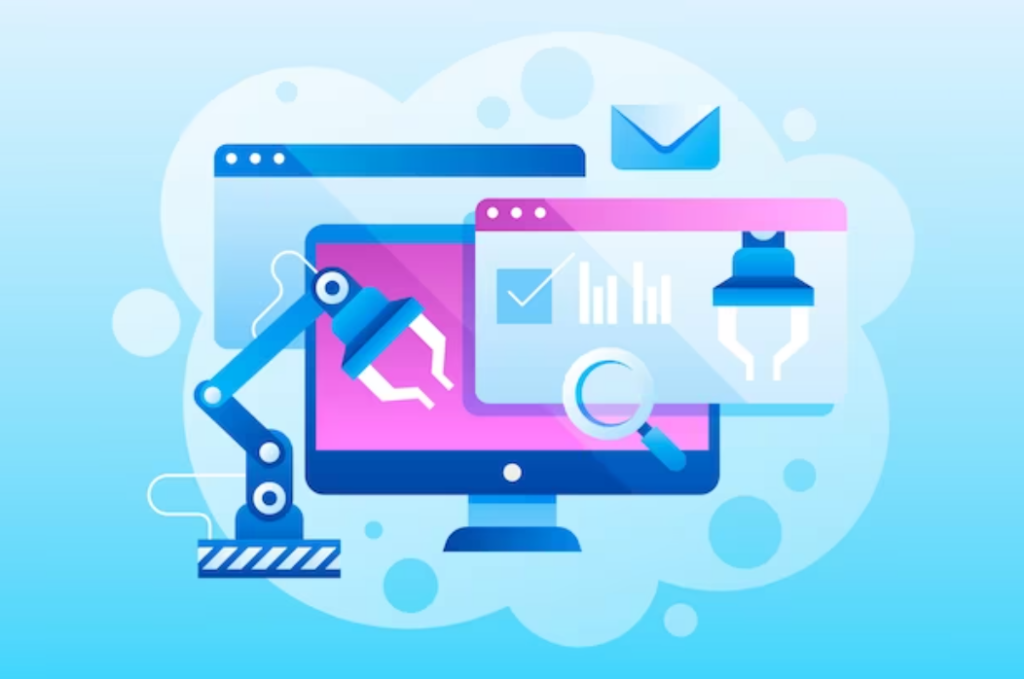
Marketing automation is a comprehensive technology and strategy that enables businesses to streamline, automate, and measure their marketing tasks and workflows.
It encompasses a variety of software platforms designed to improve the efficiency and effectiveness of marketing processes, from lead generation and nurturing to customer retention.
For instance, leveraging a free invoice receipt maker can simplify billing workflows, ensuring consistency and professionalism in documentation while saving time.
Marketing automation allows organizations to deliver personalized or targeted content, messages, and experiences to their audience at the right time, maximizing customer engagement and optimizing marketing efforts.
Following are marketing automation examples of how you may use marketing automation flows in various business types.
B2B marketing automation examples
In the realm of B2B marketing, the implementation of marketing automation has revolutionized the way businesses engage with their audience and drive growth.
From lead generation to nurturing and sales alignment, B2B marketing automation examples are powerful illustrations of how technology can enhance efficiency and deliver targeted, personalized content.
Explore these examples to understand how businesses leverage marketing automation to succeed in the competitive B2B landscape.
1. Lead scoring & nurturing
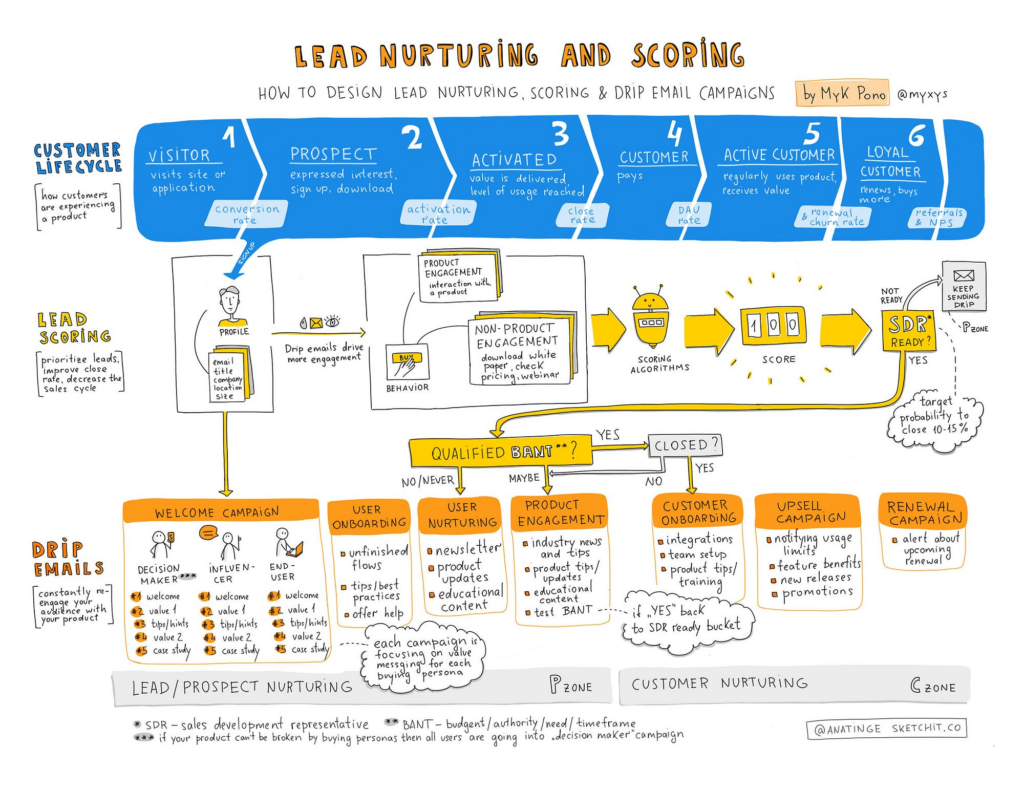
Among the various marketing automation examples, lead scoring and nurturing (an essential aspect of marketing automation) is a fundamental strategy for B2B organizations.
By assigning scores to leads based on their interactions with your content, you can quickly identify hot prospects.
For instance, if a lead downloads a whitepaper on your B2B software, they receive higher scores.
Marketing automation platforms enable you to automate personalized nurturing campaigns, such as sending informative follow-up emails tailored to the lead’s score, thus guiding them through the sales funnel.
These marketing automation examples demonstrate the power of CRM automation in the B2B sector, increasing efficiency and lead conversion rates.
2. Email marketing campaigns

Email marketing is a classic yet powerful tool in marketing automation.
With marketing automation ideas, you can send targeted and personalized emails to different segments of your B2B audience.
Consider this marketing automation example: for leads showing interest in a particular product, marketing automation can send automated emails containing relevant content and offers.
This is a prime example of how marketing automation platforms facilitate efficient email marketing automation, ensuring your messages resonate with your audience.
3. CRM integration
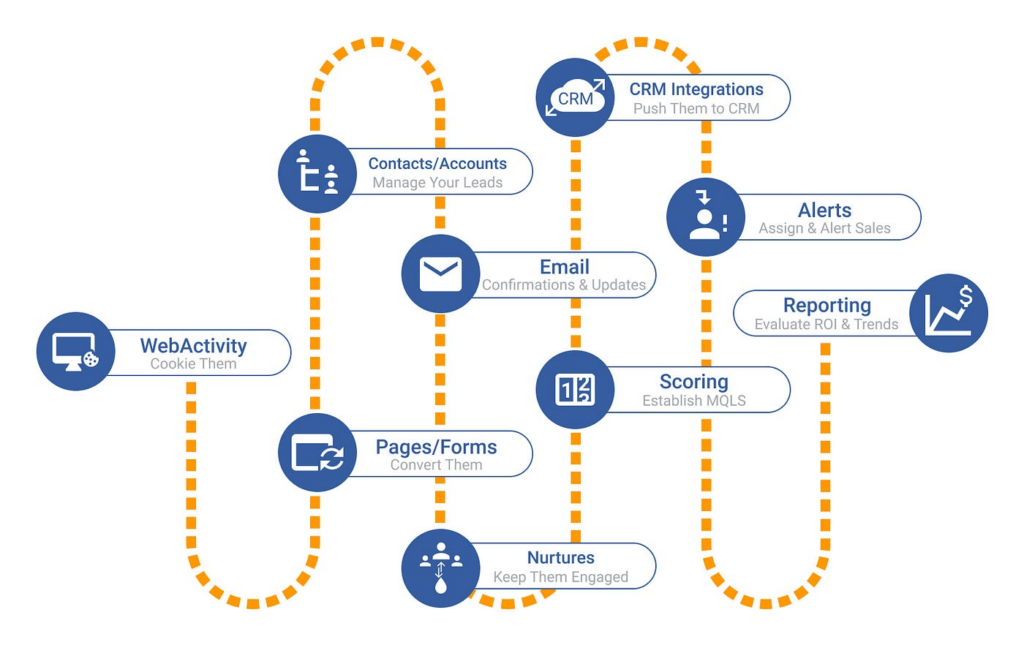
CRM automation examples showcase the seamless integration of marketing automation with CRM systems, enhancing data management or collaboration between sales and marketing teams.
This is a pivotal example of marketing automation in action.
Real-time data sharing enables the delivery of timely and relevant content, which is crucial for the effective nurturing of B2B leads.
These marketing automation examples emphasize the importance of bridging the gap between marketing and sales.
4. Content marketing automation
Marketing automation campaign examples often revolve around automating content distribution.
By scheduling blog posts, social media updates, and email newsletters at optimal times, you can ensure that your B2B content reaches the right audience when they are most receptive.
These examples of marketing automation demonstrate how you can leverage marketing automation platforms to streamline your content marketing efforts, making them more efficient and effective.
5. Webinar registration and follow-up
Another B2B marketing automation example pertains to webinars, a valuable tool for lead generation.
Marketing automation platforms can handle webinar registration, reminder emails, and post-webinar follow-ups.
This not only saves time but also ensures that attendees receive relevant content that nurtures their interest.
These examples of marketing automation show how technology can enhance the event experience and lead nurturing.
6. Lead qualification
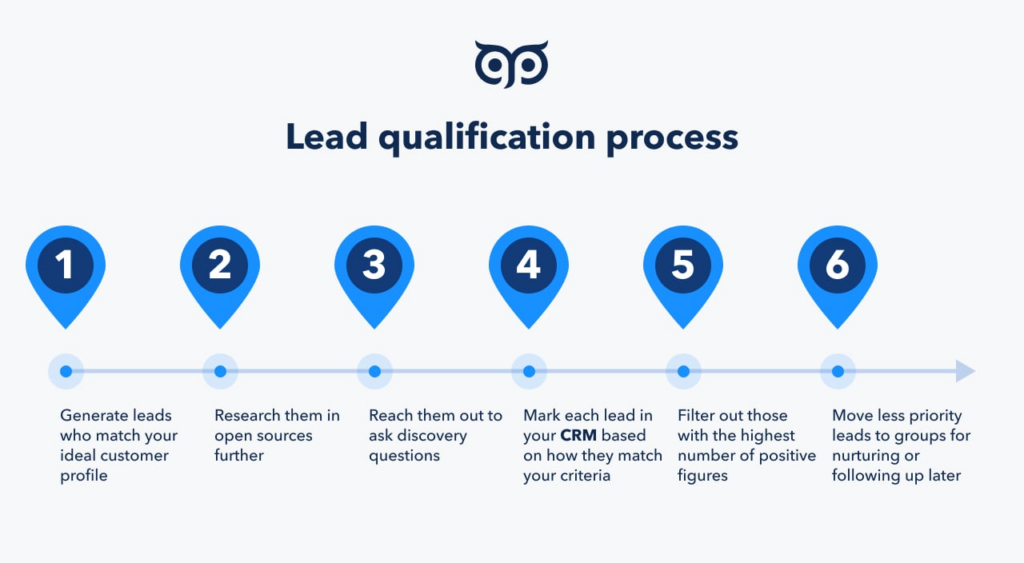
One of the most compelling marketing automation examples is lead qualification.
Automation allows you to define criteria and assign scores to leads based on their interactions, facilitating the identification of high-quality leads.
For instance, a lead that consistently engages with your B2B content receives a higher score.
Marketing automation makes this efficient lead qualification possible, ensuring your sales team focuses on the most promising leads.
7. Drip email campaigns
Drip email campaigns are an example of marketing automation that nurtures B2B leads over time.
With marketing automation platforms, you can automate the delivery of a series of personalized emails at predetermined intervals.
For example, a drip campaign can begin with a welcome email and progress to more detailed content, effectively nurturing leads through different stages of the buyer’s journey.
8. Event marketing automation

For B2B events such as conferences and trade shows, marketing automation can significantly streamline the attendee experience.
Automation takes care of event registration, ticketing, and post-event surveys, making the process more efficient and enhancing the overall event experience.
These marketing automation examples underscore its role in simplifying event management and ensuring attendees receive support.
9. Account-based marketing (ABM)
Account-based marketing is a targeted strategy that focuses on high-value accounts.
Marketing automation provides the ability to create account-specific content and campaigns.
For example, you can automate account-specific email sequences, tailoring the messaging to address the unique needs of individual target accounts.
These marketing automation examples demonstrate how technology can drive highly personalized and effective marketing for B2B accounts.
10. Sales funnel analytics
Analytics is a crucial part of marketing automation.
Marketing automation platforms provide insights into how B2B leads progress through the sales funnel, allowing you to track their interactions and optimize your strategies.
These marketing automation examples highlight the power of data-driven decision-making in enhancing lead-to-customer conversion rates and ROI.
Through these examples, marketing automation becomes an essential tool for continuous improvement in B2B marketing.
B2C marketing automation examples
B2C (Business-to-Consumer) marketing automation is a driving force behind personalized, customer-centric marketing strategies.
It empowers businesses to engage and nurture their consumer base with precision and efficiency.
In this section, we will explore several compelling B2C marketing automation examples, highlighting the innovative ways in which businesses leverage automation to create exceptional customer experiences and drive sales.
1. Abandoned cart recovery
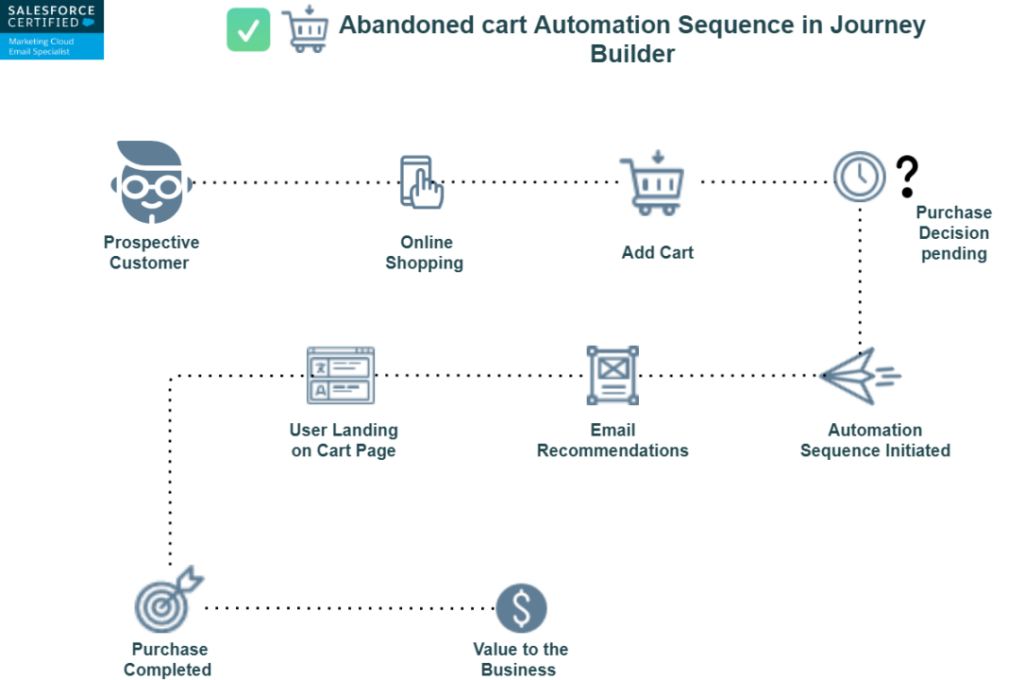
B2C marketing automation examples often start with cart abandonment recovery, a common challenge in e-commerce.
Automation helps recover potentially lost sales by triggering a series of personalized emails to customers who abandon their online shopping carts.
These emails can include product reminders, enticing discounts, and a sense of urgency, all aimed at persuading the customer to return and complete the purchase.
This is a prime example of marketing automation in the B2C sector.
2. Product recommendations
B2C marketing automation leverages machine learning algorithms to offer automated product recommendations.
By analyzing a customer’s browsing and purchase history, the system suggests products the customer will likely be interested in.
This example of marketing automation demonstrates how businesses can boost cross-selling and upselling opportunities, increasing revenue and enhancing the shopping experience.
3. Behavior-based triggers
Behavior-based triggers, an essential element of marketing automation, respond to specific customer actions or milestones.
For instance, automated emails can be triggered to celebrate a customer’s brand anniversary or offer a special birthday discount.
These marketing automation examples highlight the power of personalized and timely communication in creating engaging customer experiences in the B2C space.
4. Personalized loyalty programs

Automating loyalty programs is a potent B2C marketing strategy that encourages customer retention.
Automated reward systems recognize and incentivize customers for their loyalty, often through loyalty points, discounts, or exclusive offers.
Incorporating review tools for marketers ensures you select the most effective platforms for automated reward systems, which recognize and incentivize customers for their loyalty, often through loyalty points, discounts, or exclusive offers.
This example of marketing automation shows how businesses can foster repeat purchases and brand advocacy.
5. Dynamic content personalization
B2C marketing automation allows for dynamic content personalization, where website and email content adapt based on individual customer preferences and behavior.
This ensures that each customer receives the most relevant and engaging content, significantly improving their experience and increasing the likelihood of conversion.
This marketing automation example underscores the importance of personalization in engaging customers.
6. Re-engagement campaigns
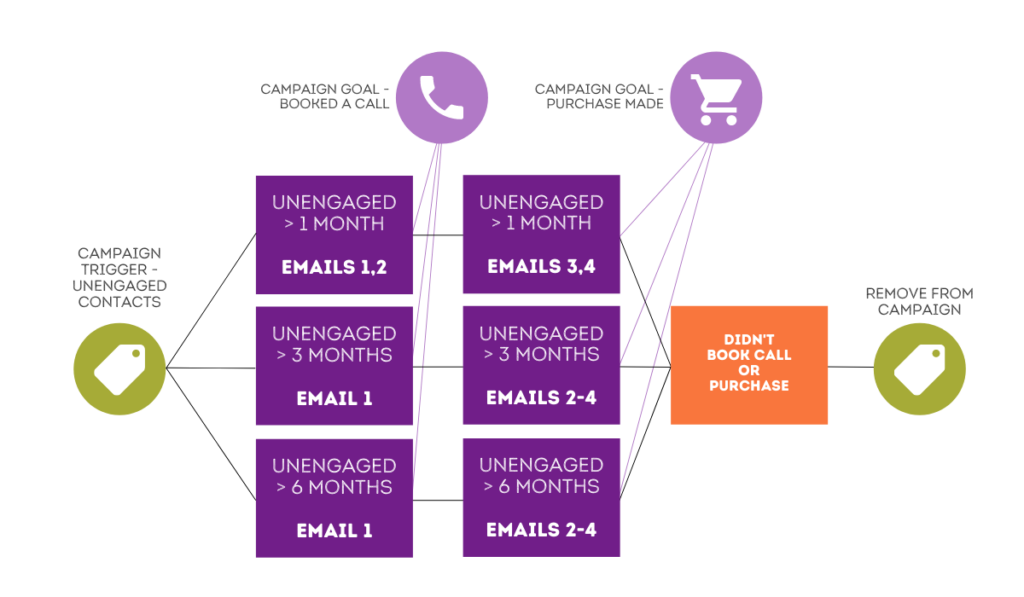
Automated re-engagement campaigns aim to win back customers who have become less active.
Such campaigns often involve offering special discounts, showcasing new products, or reminding customers of the value they can gain from your brand.
These examples of marketing automation demonstrate how businesses can efficiently re-engage customers who may have drifted away.
7. Feedback and review requests
After a customer completes a purchase, marketing automation simplifies the process of collecting feedback and reviews.
Automated requests typically include a direct link to leave a review, making it easy for satisfied customers to share their experiences and contribute to social proof.
These marketing automation examples highlight the role of automation in gathering valuable feedback and testimonials.
8. Win-back campaigns
When customers become lapsed or inactive, marketing automation can automatically trigger win-back campaigns.
These typically consist of emails to re-engage the customer with enticing offers, reminders of your brand’s value, and reasons to return.
These examples of marketing automation highlight the effectiveness of automated efforts in rekindling customer interest and boosting customer retention in the B2C space.
9. Subscription renewal reminders
For subscription-based businesses, automated reminders for subscription renewals are indispensable.
Marketing automation ensures subscribers receive timely notifications to renew or upgrade their memberships.
This proactive approach minimizes churn and maximizes customer lifetime value by encouraging continued participation in your services or products.
These examples of marketing automation platforms showcase their role in subscription management and customer retention.
10. Event-based triggers
B2C marketing automation enables the creation of automated campaigns triggered by specific customer actions or events.
For instance, when customers sign up for your newsletter, they can automatically receive a welcome series of emails containing valuable content and special offers.
This personalized approach nurtures their relationship with your brand.
These event-based triggers exemplify how marketing automation can help you engage with your audience in a timely and individualized manner, enhancing customer loyalty and driving conversions.
Conclusion
In the realm of marketing, the 20 best marketing automation examples showcased in this article are a testament to the transformative power of technology in revolutionizing how businesses engage with their audience.
From lead nurturing and email campaigns to personalized content delivery and CRM integration, these marketing automation examples exemplify the diversity and impact of automation across various sectors.
As the marketing landscape evolves, these best practices will serve as invaluable reference points, guiding businesses toward more efficient, effective, and customer-centric marketing strategies.
By harnessing the potential of marketing automation, organizations can optimize their marketing efforts, build stronger customer relationships, and stay competitive in the ever-changing marketing world.
